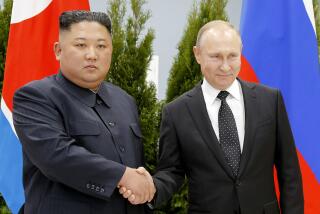North Korea foreign trade falls sharply
- Share via
Reporting from Seoul — Even before the deterioration last year of already tenuous relations between North and South Korea, Pyongyang was suffering from a severe foreign trade slump, analysts say.
The decline in trade, attributed in large part to international sanctions over North Korea’s nuclear weapons program, was the largest for the reclusive nation since 1998, according to a new report by Seoul-based Korea Finance Corp. Total North Korean trade amounted to $3.41 billion in 2009, down 10.6% from 2008, the report says.
With few options for trade, North Korea has been forced to rely even more heavily on its neighbor and key ally, China, experts say.
But it is unclear how much external trade matters to North Korea, because its exports are already so small that even a nearly 11% drop is not that significant, some experts say.
“It’s painful but not lethal,” said Rudiger Frank, a professor of East Asian economy and society studies at Vienna University. “North Korea’s trade levels are already so low the drop should not be overemphasized.”
Analysts say Pyongyang’s economic doldrums demonstrate the continued effects of international sanctions imposed after North Korea conducted a nuclear test in 2009.
“The regime faces a very difficult time ahead,” said Jeong Hyung-gon, a senior research fellow for the Korea Institute for International Economic Policy in Seoul. “They know that to turn things around, they cannot simply rely on China.”
Further exacerbating the situation has been Pyongyang’s increasingly icy relations with South Korea, traditionally a major trading partner.
In 2008, South Korea suspended tourism to the Mt. Kumgang resort in North Korea after a 53-year-old South Korean homemaker was shot to death by North Korean soldiers, apparently while she was taking a sunrise walk on a beach. At the end of that year, North Korea restricted traffic across the border, and later shut down a jointly run industrial park in the North. The ventures were moneymakers for the regime.
Last March, a South Korean warship was sunk, killing 46 crewmen. When South Korea eventually accused Pyongyang of having torpedoed the boat, North Korea defiantly said it would sever all ties with its neighbor. Since then, inter-Korean trade has dropped 30%.
In November, four people died when North Korea shelled a South Korean island.
In recent days, North Korea has proposed resumption of the joint tourism program and the industrial park. But that strategy took a hit Monday when South Korea once again rejected the North’s attempt at renewing talks between the two.
Experts say Pyongyang is looking for cash outside China, which is estimated to account for as much as 80% of North Korea’s international trade but which has recently taken a tougher line on the regime.
“After the North’s attacks on South Korea in March and November, we believe China put much more economic pressure on Pyongyang to stay in line,” researcher Jeong said. “But the North Koreans are so self-reliant, not even Beijing has total control, so Pyongyang reaches out to both China and South Korea.”
The report, released Sunday by Korea Finance, recommends that to revive its economy, North Korea must improve internal facilities such as power plants; diversify its exports, which now rely mostly on weapons; and seek better economic ties with Seoul.
Vienna University’s Frank said he believes that North Korea has moved from exporting weapons to selling raw minerals, thanks to infrastructure assistance from China.
“They’re what keep North Korea alive,” he said. “Of all the minerals of the world, research shows that only lead and tin are missing in North Korea. They have the stuff other nations are interested in. And China is helping the north get them out of the ground.”
He also did not discount North Korea’s black-market trade with China. “You have countless little smuggler ants sneaking into China with goods on their backs thousands of times a day,” Frank said. “The border between the two nations is essentially unguarded. And those guards who are there can all be bribed.”
More to Read
Sign up for Essential California
The most important California stories and recommendations in your inbox every morning.
You may occasionally receive promotional content from the Los Angeles Times.














